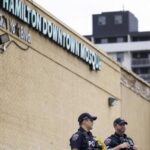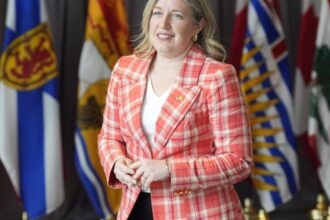The scorched hills surrounding Parker Cove on the western shore of Okanagan Lake tell a harrowing tale of nature’s unpredictable fury. After days of anxiety and displacement, some residents of this small British Columbia community have finally been permitted to return home as officials rescinded an evacuation order issued last Friday when the out-of-control wildfire threatened the area.
The Central Okanagan Emergency Operations Centre announced the welcome news late Monday, signaling a partial reprieve for exhausted residents. However, this return comes with a stark warning – the Glen Lake wildfire remains an active threat, listed at approximately 1,116 hectares and still classified as out of control by provincial authorities.
“While some families are experiencing the relief of returning to their properties, we must remember that the emergency situation continues,” said Mark Ford, Emergency Operations Director. “The downgrading to an evacuation alert means residents must remain vigilant and prepared to leave again at a moment’s notice.”
The BC Wildfire Service reports that crews have been making significant progress establishing containment lines on the fire’s eastern flank – the side nearest to residential areas. This strategic effort has provided enough confidence for officials to allow residents to return, albeit under the shadow of continued risk.
Regional officials confirm that structural damage assessments remain ongoing, with at least three properties affected by the blaze. The Central Okanagan Regional District has established a resiliency centre to support affected residents, offering essential services and guidance during this transitional period.
For many Canadian communities, this situation represents the new normal of extended wildfire seasons. Climate scientists have repeatedly connected the increasing frequency and intensity of wildfires across British Columbia to climate change patterns that create hotter, drier conditions conducive to more explosive fire behavior.
The province has experienced an unusually active early fire season, with dozens of significant blazes currently burning across British Columbia. Provincial resources remain stretched thin as firefighting crews battle multiple fronts simultaneously.
“The combination of drought conditions and early-season heat has created particularly dangerous fire conditions this year,” explains Dr. Elizabeth Chen, climate researcher at the University of British Columbia. “What we’re witnessing is consistent with predicted climate models showing extended fire seasons becoming the norm rather than the exception.”
For Parker Cove residents, the immediate crisis may have eased, but the broader implications linger. Many returning families face the psychological toll of potential re-evacuation, alongside practical challenges like addressing smoke damage, food spoilage from power outages, and reconnecting utilities.
Local businesses in the wider Okanagan region also report significant economic impacts as tourism – a vital economic driver – suffers during peak summer season. The economic ripple effects extend well beyond the fire perimeter, affecting everything from wineries to hospitality venues throughout the valley.
Provincial officials urge all British Columbians to remain vigilant about fire risks, with campfire bans and outdoor burning restrictions in effect across most of the province. Residents in fire-prone areas are advised to maintain emergency preparedness kits and evacuation plans throughout the summer months.
As climate patterns continue to shift and wildfire seasons grow longer and more intense, how will communities like Parker Cove adapt their infrastructure, emergency response systems, and even cultural practices to this evolving reality of living with increased fire risk?























